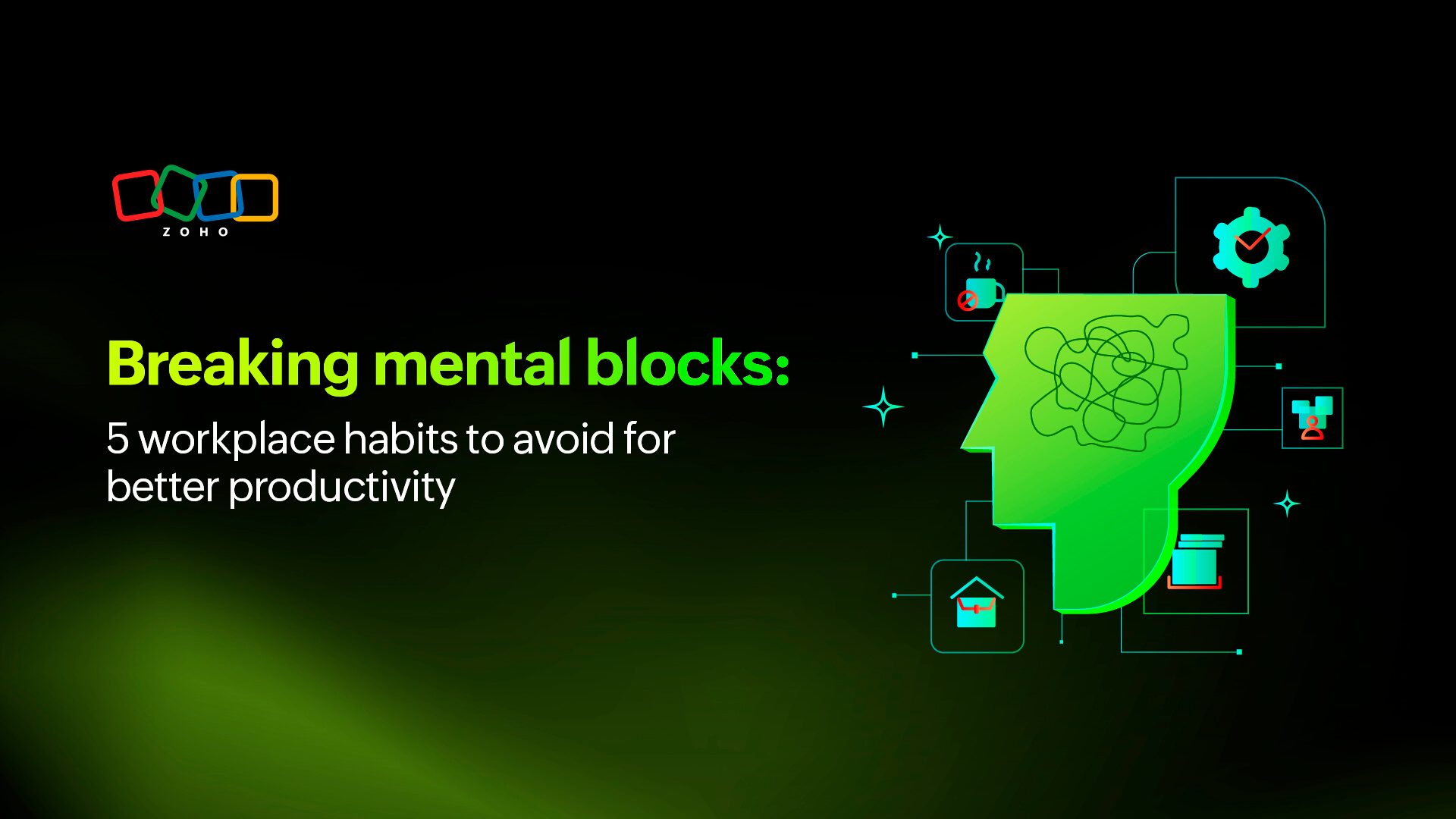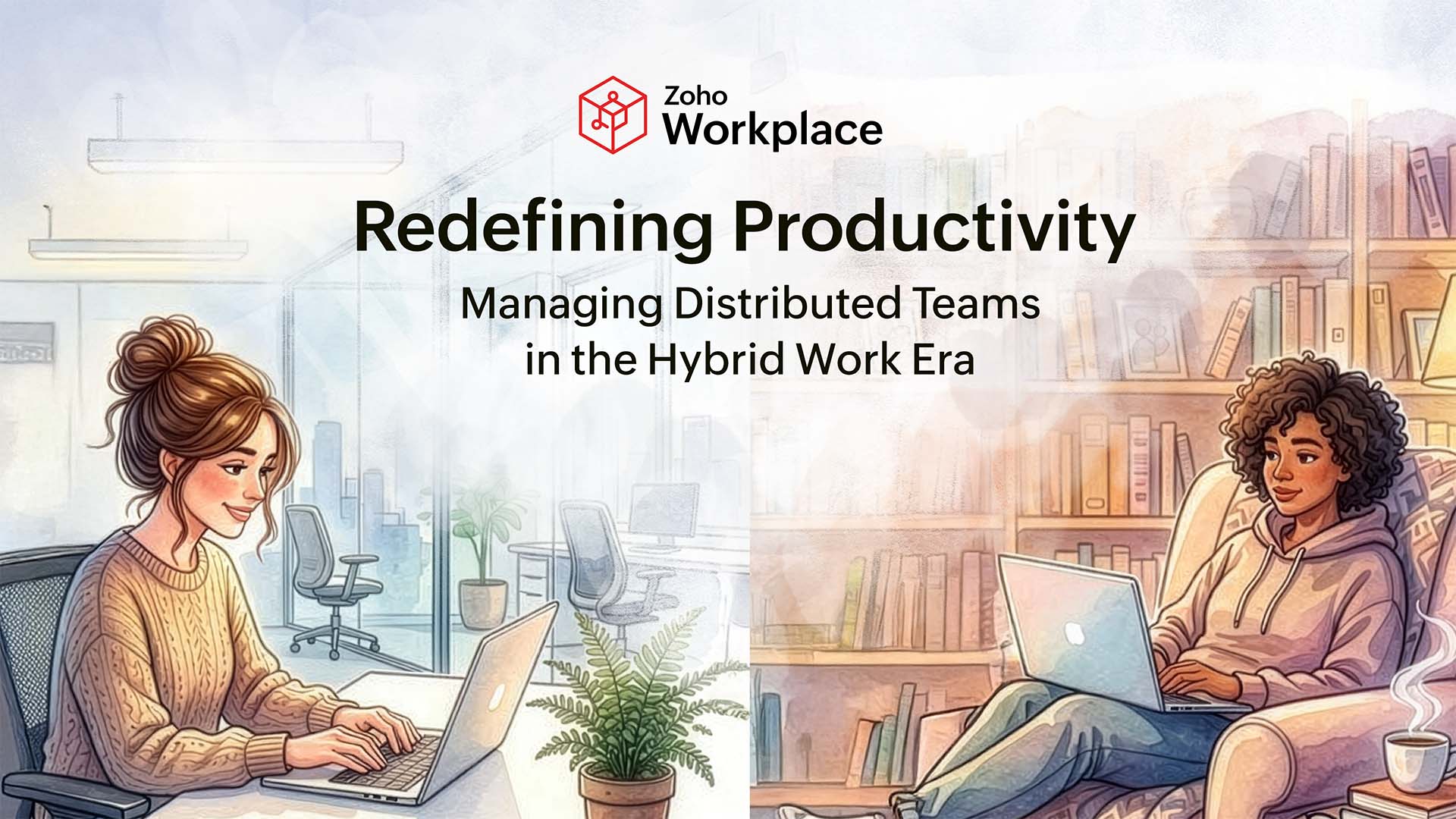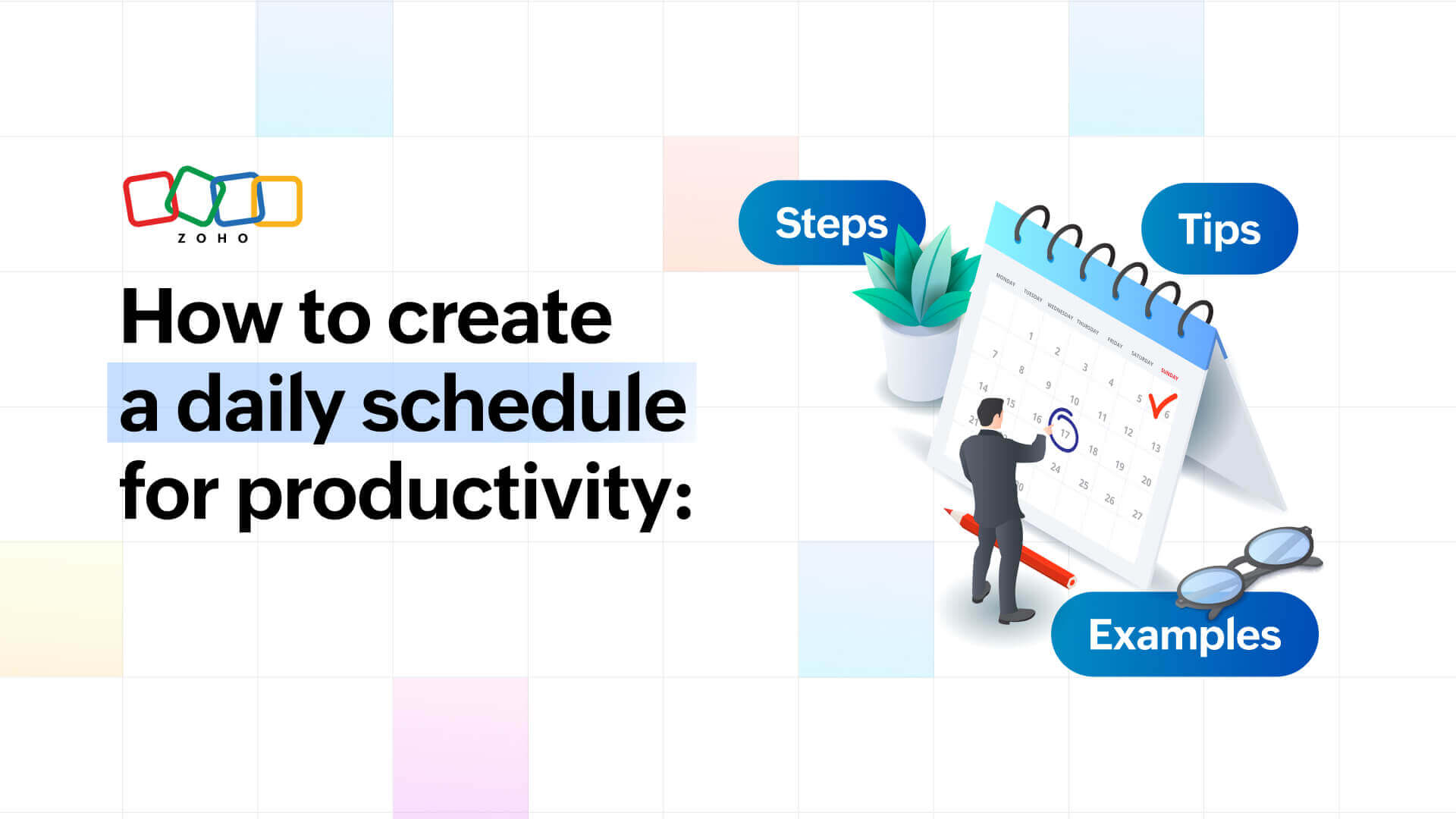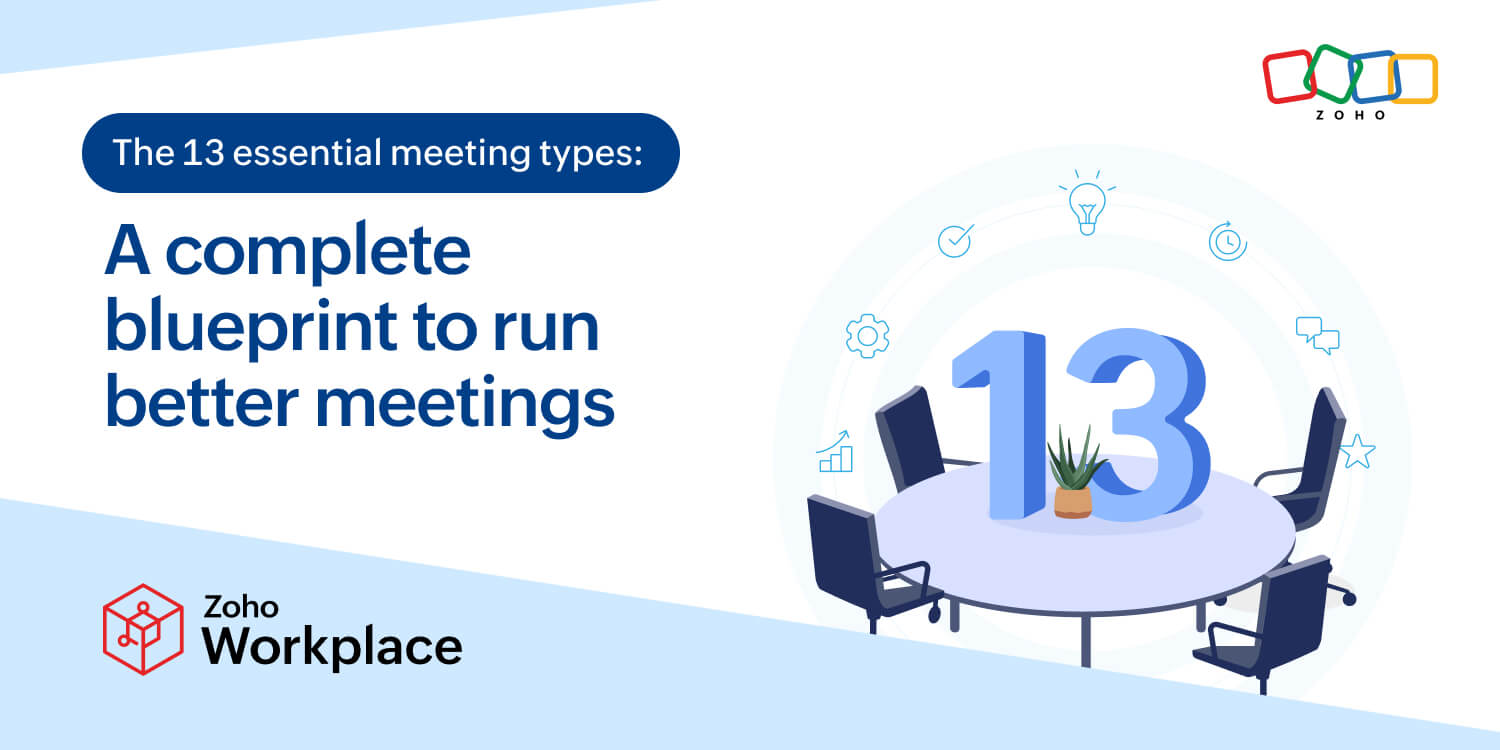- HOME
- All Topics
- Productivity in the workplace
- 5 workplace habits that cause mental blocks and how to avoid them
5 workplace habits that cause mental blocks and how to avoid them
- Published : December 23, 2024
- Last Updated : December 23, 2024
- 876 Views
- 6 Min Read
What are mental blocks?
Have you ever felt like your brain has stopped working? You stare at your screen, trying to make progress, but no ideas come to mind. Even simple tasks feel too hard. That’s a mental block—a state where your brain struggles to process information or focus, no matter how hard you try.
Why do mental blocks happen?
Mental blocks are more than just a moment of frustration; they're your mind’s way of indicating something is wrong. While occasional mental blocks are normal, certain everyday habits can make them more frequent. Stress, fatigue, and ingrained work habits can all contribute to mental blocks. If left unaddressed, this can significantly impact your productivity, decision-making, and confidence at work.
Common causes of mental blocks at work
To overcome mental blocks, it's essential to understand them first. By identifying the patterns and triggers behind these mental roadblocks, you can better address them before they disrupt your day.
In this article, we'll explore five common workplace habits that cause mental blocks and simple, actionable ways to break free from them.

1. Multitasking: Trying to do it all at once
We've all done it—juggled multiple tasks at once, thinking that's the only way to keep up with a busy workday. But in reality, multitasking is one of the biggest contributors to mental blocks. When you switch between tasks—like answering emails while working on a report—you’re not giving either task your full attention. Each time you switch tasks, your brain has to refocus, which requires more time and energy than you can imagine. Over time, this habit can overload your brain, making it more challenging to think clearly. This constant juggling leaves you feeling scattered, overwhelmed, and less productive.
What to do instead:
- Focus on one thing at a time: Choose one task and give it your full attention until you finish it, and then move to the next task. This way, you'll feel more in control and less stressed.
- Use time blocks: Allocate specific time slots for each task during your day with a short break in between. For example, spend 30 minutes responding to emails followed by a 5-minute break and then shift to your next priority.
- Limit distractions: Turn off unnecessary notifications and let your teammates know when you need some uninterrupted time to stay focused.
By focusing on one thing at a time, you'll not only complete the task faster but also feel less stressed.
2. Overloading your to-do list
Have you ever looked at your to-do list and felt like giving up before you even started? It’s easy to think the more tasks you squeeze into your day, the more productive you’ll be. However, an overloaded to-do list leaves you overwhelmed and unsure of where to begin, and this can lead to procrastination. And the guilt of not crossing off enough tasks can make it even harder to focus.
What to do instead:
- Prioritize what matters: Start your day by identifying three to five essential tasks that you absolutely must complete. Focus on completing those tasks before moving on to others.
- Break it down: To make big tasks feel less overwhelming, break them down into smaller, actionable steps. For example, instead of writing “Finish presentation,” list smaller steps like “Choose a template,” “Gather data,” and “Add visuals.”
- Celebrate small wins: Instead of focusing on what's left to be done, celebrate your accomplishments at the end of each day. Even if you only tick off one or two important tasks, it's progress, and you should acknowledge it.
A shorter, realistic to-do list can provide you with the clarity and motivation needed to accomplish tasks without feeling overwhelmed.
3. Skipping breaks: Pushing without rest
Do you often find yourself skipping breaks, telling yourself, “I’ll just finish this one last email,” only to move on to the next task and the next, until you’re completely drained? At first, skipping breaks might seem like a smart way to get more done. However, it’s like trying to drive a car on an empty tank; it won’t take you far. Over time, your focus fades, creativity declines, and even simple tasks become challenging. Your brain, just like your body, needs rest to stay sharp and focused. Without regular breaks, you risk burnout, slower thinking, and are more likely to hit a mental block.
What to do instead:
- Take regular, short breaks: Use techniques like the Pomodoro Technique, which suggests 25 minutes of work followed by a 5-minute break. It helps keep your mind fresh and productive.
- Move your body: A 5-minute walk, stretching, or just stepping away from your desk can work wonders. Moving your body can increase blood flow and help clear your mind.
- Unplug for a moment: Step away from your screen during breaks—try to do something relaxing like deep breathing, listening to music, enjoying a snack, or even daydreaming for a few minutes.
Taking breaks isn't a waste of time; it's an investment in your productivity. When you take a break and recharge, you return to your work feeling refreshed and more focused, ready to tackle the next task.
4. Poor time management: The silent stress builder
When you don't manage your time well, small tasks start piling up, big ones feel overwhelming, and you spend more time stressing about what to do than actually getting things done. Poor time management doesn’t just leave work unfinished—it builds stress that clouds your thinking and causes mental blocks. It’s like swimming in a sea of deadlines without a clear direction—you end up exhausting yourself without making real progress.
What to do instead:
- Plan your day: Spend a few minutes each morning or the night before listing your top priorities for the day. Be realistic about what you can achieve in a day. Knowing what needs attention first can help you stay focused.
- Tackle the hardest task first: Handle the hardest or most important task early in the day when your energy is highest. Once the biggest challenge is out of the way, everything else will feel easier.
- Use productivity tools: Apps like calendars, task managers, or even a simple notebook can help you organize your workload and stay on track.
5. Mixing work and personal life: The blur that causes burnout
In today’s always-connected world, the lines between work and personal life can easily blur, like checking emails late at night or thinking about work during dinner when you’re supposed to be relaxing.
While it might seem harmless at first, this constant overlap between work and personal life can leave your brain in a state of perpetual “on” mode. When your mind is constantly overlapping between work mode and personal mode, it never truly gets the chance to rest, making you more prone to mental blocks. It’s hard to be productive when you never get a chance to fully unwind.
What to do instead:
- Define your work hours: Set clear start and end times for your workday and stick to them.
- Create a dedicated workspace: If you're working from home, set up a separate area exclusively for work-related activities. This helps in mentally disconnecting from work once your designated work hours are over.
- Unplug after hours: Turn off work notifications or set your devices to “Do Not Disturb” mode once your workday is over to unwind fully.
Why these changes matter
Mental blocks happen to all of us—it’s part of the work-life journey. But the good news is, they don’t have to take over your day. By paying attention to how you manage your tasks, stepping away when needed, and setting clearer boundaries, you can prevent yourself from getting mentally stuck. When you begin implementing small changes, you’ll find yourself feeling more in control, less stressed, and ready to take on whatever comes your way.
But remember, you don’t have to make all of these changes overnight. Start with one habit, like focusing on single-tasking, and gradually build on it. Over time, you’ll create a clearer, calmer mind that’s equipped to handle challenges with confidence.
 Revathi Selvaraj
Revathi SelvarajRevathi is a product marketer at Zoho Workplace. She writes about topics related to workplace collaboration, productivity, and personal development. Outside of work, she enjoys painting, cooking, and occasionally laughing at her own jokes, all while embracing the present moment.



Comments(2)
I love this piece—it provided great insights on avoiding mental blocks, particularly with effective time management. Thank you, Revathi!
Thank you for your kind words, Temidayo.